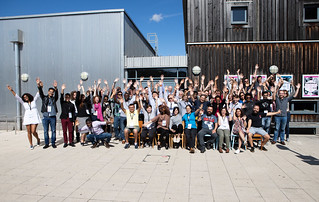eLife Innovation Sprint 2019: Accelerating innovation through open collaboration
eLife Innovation Sprint 2019: Accelerating innovation through open collaboration
Posted on 18 October 2019
eLife Innovation Sprint 2019: Accelerating innovation through open collaboration
Posted by g.law on 18 October 2019 - 9:12am
 Photo credit: Jess Brittain
Photo credit: Jess Brittain
September 4 and 5 marked the second instance of the eLife Innovation Sprint, a collaborative event where 60 researchers, developers, designers, technologists, publishers and others gather to develop open-source prototypes for open science and research communication.
An open, community-driven approach towards innovation in open science
Technological advancement has created many opportunities for developing tools for real-time collaborations, text-mining, interactive data visualisations, sharing reproducible compute environments, etc. These tools can change the ways researchers share, discover, consume and evaluate research and help promote open science and encourage responsible research behaviours.
The aim of the eLife Sprint was to provide the community with space, time and access to diverse skill sets in order to develop ideas for new tools into prototypes and forge new collaborations. After introducing themselves and sharing their project ideas, participants formed groups organically around complementary interests and objectives, resulting in 14 projects with team sizes ranging from two to ten.
The projects ranged from web tools and interfaces to crowdsource research quality indicators, to machine learning tools for topical knowledge extraction. A few projects particularly relevant to this blog’s readers are highlighted below – for a full project roundup, please visit eLife Labs.
A team at the Sprint also produced a podcast capturing the dynamics of the event and highlighting some of the projects and voices of participants.
Inclusion in computational settings
Motivated by her own experience in delivering computational training, Sara El-Gebali organised a workshop at the CarpentryConnect event in Manchester in June, with the aim to learn from the Carpentries community’s collective experiences to help create a Dos and Don’ts checklist for computational teaching. At the eLife Innovation Sprint, she worked together Offray Luna, a researcher and hacktivist, to reformat their original list of resources into a Wiki format to enhance readability and scalability, and interviewed other Sprint participants to gain first-hand insight and build diverse use cases.
You are invited to read and contribute to the project’s GitHub Wiki, and to sign up to updates using this Google form.
#TimeToShine: @yalahowy and Offray have been compiling a list of tools and advice at #eLifeSprint to increase #inclusion in computational settings. Sign up to be notified once it’s available and contribute to the resource here https://t.co/hmQ5U0ySxv pic.twitter.com/Bwr5o1THx3
— eLife Innovation (@eLifeInnovation) September 5, 2019
Tools for better software citation
Software citations can assist researchers in assessing, understanding and reproducing the research methods and results by linking the work to relevant software version(s), and also help them to acknowledge the contributions of software developers and contributors in a traceable manner. This calls for better guidelines and tools for software developers to make their software citable, as well as for publishers and researchers to cite software correctly and easily.
This project originated at the Bioinformatics Open Source Conference (BOSC) CollaborationFest in July. At the Sprint, the team expanded to include experts in journal production, database curation and product design. Together, they explored different missing pieces that are necessary to monitor software citation using existing open science tools (e.g. Zenodo, Zotero and GitHub). They then mapped various user workflows and began building a web interface that would allow research software developers to generate a citation file and provide and edit rich metadata, which could be integrated into platforms such as Zenodo. The web interface will also allow publishers to request citation information and metadata.
The team invites you to contribute to the project's GitHub repository.
A global gathering
Thanks to the generosity of the Software Sustainability Institute and other Diversity and Inclusion partners of the Sprint, we were able to support the participation of 21 innovators from under-represented communities.
“I want to create bridges between the north and south, because we have a lot of open practices, a lot of technologies, that are not visible. [...] I think that this is a place for this kind of meeting of new practices, new perspective and diversity.”
- Offray Vladimir Luna Cárdenas, Researcher + Hacktivist
A welcoming environment
We wanted to create an event that was welcoming, inclusive and safe for the community. While organising the Sprint, we learnt a lot from events organised by the Carpentries and SSI communities, e.g. creating an A-to-Z guide for participants, encouraging the use of the Pac-man rule. We strive to make more of our event planning resources open in the near future so that it could be adopted and reused by other communities.
Loving #eLifeSprint's participation tips for an inclusive and welcoming event! Inspired by @swcarpentry #Diversity #Inclusion -- wishing every ppl at every scientific conference would follow those! pic.twitter.com/OeV9w6Qy8Q
— Leonie Mueck (@LeonieMueck) September 4, 2019
